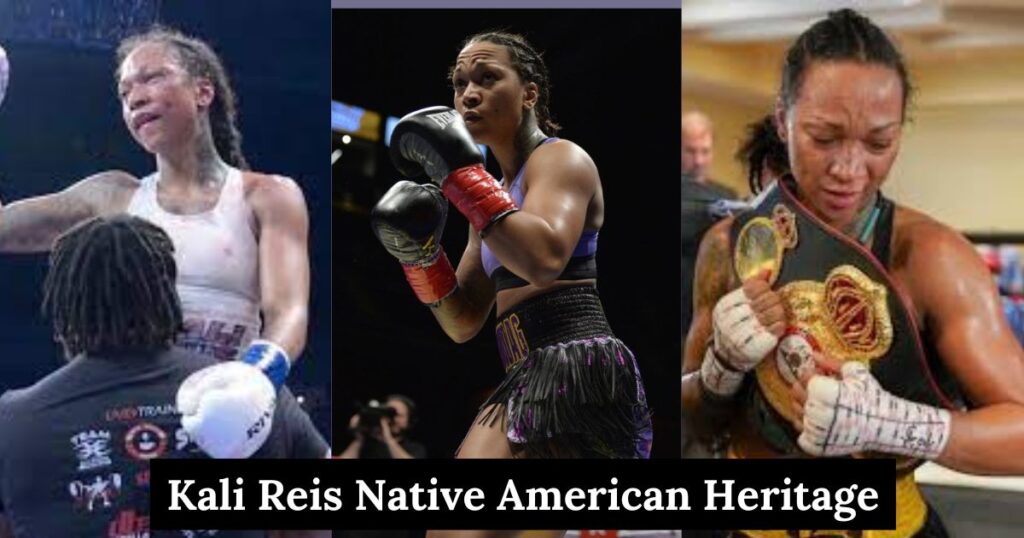Ever wondered about the woman behind the boxing gloves? Kali Reis, born in 1986 in Providence, Rhode Island, is a fascinating blend of three rich cultural heritages. Through her mother, she carries the proud legacy of Cherokee and Seaconke Wampanoag Native American tribes. Her father’s side brings Cape Verdean and African American roots to her story.
This champion boxer turned actress represents more than just athletic excellence she’s a living testament to the power of diverse cultural heritage. Her family background shapes not only her fighting spirit but also her passionate advocacy for Indigenous rights and social justice.
Kali Reis Cultural Background
Many fight fans know Reis as a fierce competitor in the ring, but her story starts with the remarkable blend of cultures that flow through her veins. Her journey from Providence’s diverse neighborhoods to world championship glory carries the legacy of three distinct heritages Native American, Cape Verdean, and African American.
| Category | Athletes |
| Full Name | Kali Reis. |
| Birthdate | August 24, 1986 |
| Birthplace | Providence, Rhode Island. |
| Ethnicity | Native American, Cape Verdean, and African American descent. |
| Father Ethnicity | Cape Verdean and African American descent. |
| Mother Ethnicity | Cherokee and Seaconke Wampanoag descent. |
Walking through Providence’s streets as a young girl, Reis absorbed the vibrant mix of cultures that would later define her identity. The city’s mix of communities created the perfect environment for her to embrace every aspect of her background, fostering a deep appreciation for her unique heritage.
Kali Reis Native American Heritage

The soul of Reis’s identity beats strongest through her Native American roots. Through her mother, she carries the blood of both Cherokee and Seaconke Wampanoag peoples. These aren’t just entries on a family tree they’re living traditions that shape her worldview and fighting spirit.
The Cherokee people’s story of survival, particularly through the Trail of Tears, resonates deeply in how Reis approaches challenges. When she steps into the ring, she carries the resilience of ancestors who faced unimaginable hardships yet preserved their culture and dignity.
As a Seaconke Wampanoag descendant, Reis maintains a special connection to her New England roots. The Wampanoag people’s deep ties to Rhode Island and Massachusetts mirror her own connection to the region. Their traditions of strength and community continue to influence her approach to both boxing and advocacy.
Kali Reis Cape Verdean and African American Heritage
Turn another page in Reis’s family story, and you’ll find the rhythms of Cape Verde and the strength of African American history. Her father’s Cape Verdean and African American background adds layers of cultural richness to her identity that shine through in everything she does.
Cape Verde’s unique position as a cultural crossroads between Africa and Portugal has gifted Reis with traditions that emphasize resilience and adaptability. The island nation’s history of navigation and survival against odds mirrors her own path through the challenging waters of professional boxing.
Kali Reis Cultural Influence on Her Career
Watch Reis in the ring, and you’ll see more than just technical skill her fighting style embodies the warrior spirit of her Native American ancestors, the resilience of Cape Verdean seafarers, and the unstoppable determination of African American pioneers.
Beyond throwing punches, Reis has become a powerful voice for Indigenous rights. Her advocacy for Missing and Murdered Indigenous Women (MMIW) shows how she channels her platform into meaningful social change. This commitment to justice reflects the values instilled by her diverse cultural upbringing.
Kali Reis Ethnic Background
Inside the ring, they call her “KO Mequinonoag” meaning Many Feathers, Many Talents. This name captures the essence of her mixed heritage and the various gifts she brings to both boxing and advocacy. Her presence in professional sports has opened doors for greater representation of Native American, Cape Verdean, and African American athletes.
Read Also: Mike Evans Ethnicity and Parents Origin
Kali Reis Professional Career

The year 2008 marked Reis’s entry into professional boxing, but her journey began long before throwing her first professional punch. Training in Providence’s gyms, she developed a style as diverse as her background incorporating the mental toughness of her Cherokee ancestors with the fluid movement reminiscent of Cape Verdean dancing traditions.
Kali Reis Breakthrough and World Championships
2016 brought Reis’s first major triumph when she claimed the WBC World Middleweight title from Maricela Cornejo. This victory wasn’t just personal it represented a win for every community she represents. Her path continued upward, facing boxing legend Cecilia Brækhus in 2018 in a match that proved her elite status.
The years 2020 and 2021 saw Reis reach new heights. She captured both the WBA Super Lightweight title and the IBO Super Lightweight title, culminating in becoming the unified WBA and WBO World Super Lightweight champion after defeating Jessica Camara. These achievements showcased not just her boxing prowess but her ability to adapt and evolve.
Kali Reis Recent Success and Acting Career
Beyond the ring, Reis has conquered new territory in acting. Her starring role in “Catch the Fair One” brought critical acclaim and shed light on issues affecting Indigenous communities. This transition from boxer to actor demonstrates the versatility embedded in her cultural heritage.
Kali Reis Parents’ Origin
Growing up in Providence, Rhode Island, Reis experienced a unique blend of cultural influences from both parents. Her mother’s Cherokee and Seaconke Wampanoag heritage brought ancient wisdom and spiritual connections to her upbringing. Family gatherings often included traditional ceremonies and storytelling, keeping their Indigenous heritage alive.
Her father’s background introduced her to the vibrant Cape Verdean diaspora community in New England. The fusion of African and Portuguese influences from Cape Verde, combined with strong African American traditions, created a rich cultural environment at home. Through him, she learned about resilience, community strength, and the importance of maintaining cultural connections despite geographical distances.
These diverse influences weren’t just part of her childhood they became foundational elements of her identity. Her parents ensured she understood the significance of each cultural thread in her heritage, teaching her to draw strength from all aspects of her background.
Kali Reis’ Siblings
Family bonds run deep in Reis’s world. Growing up in a household that celebrated multiple cultures, she and her siblings became living bridges between different traditions. Their shared experiences navigating this rich cultural landscape helped shape their understanding of identity and community.
Kali Reis Bond with Siblings
The connection between Reis and her siblings goes beyond typical family ties. Together, they learned to embrace their unique heritage, supporting each other through the challenges of growing up with such a diverse background in Providence. Their home became a space where different cultural traditions could coexist and flourish.
During family celebrations, they participated in both Native American ceremonies and Cape Verdean traditions, creating their own unique family culture that honored all aspects of their heritage. This strong foundation of cultural pride and family unity continues to influence Reis’s approach to life and career.
Kali Reis Sibling Influence on Her Career
The support of her siblings has been crucial throughout Reis’s boxing career. From early training sessions to world championship fights, their presence has reminded her of the strength found in family bonds and cultural heritage. Their shared understanding of their unique background has provided emotional anchor points during challenging times.
Kali Reis Legacy
This legacy of cultural pride and achievement, passed down through generations and strengthened by family bonds, makes Kali Reis more than just a champion boxer. She’s a testament to the enduring power of heritage and the importance of representing one’s complete identity with dignity and purpose.
Through her ongoing work in sports, entertainment, and advocacy, Reis shows how cultural heritage can be a source of strength, inspiration, and positive change. Her journey continues to demonstrate that understanding and embracing one’s roots can lead to achievements that transcend personal success and contribute to broader social progress.
Conclusion
Kali Reis stands as a powerful example of how cultural heritage can shape and strengthen an individual’s journey. From the boxing ring to advocacy for Indigenous rights, her diverse background as a Native American, Cape Verdean, and African American woman has influenced every aspect of her life and career.
Her story isn’t just about winning championships it’s about representing multiple communities with pride and purpose. Through her professional success and dedication to social justice, Reis demonstrates how embracing one’s complete heritage can create positive change both in and out of the ring.
As she continues to break barriers in boxing and entertainment, Reis carries forward the strengths of all her ancestors Cherokee resilience, Seaconke Wampanoag wisdom, Cape Verdean determination, and African American courage. Her journey reminds us that cultural heritage isn’t just about the past it’s a living force that shapes our present and influences our future.
In Providence’s boxing gyms, on Hollywood sets, or advocating for Indigenous rights, Kali Reis embodies the power of embracing one’s complete identity. Her story continues to inspire others to honor their own diverse backgrounds while fighting for positive change in the world.
Richard is a tech aficionado with a keen eye for the latest trends and innovations. At groovymode.com, he delivers expert analysis and insightful reviews to keep you informed and ahead in the tech world.